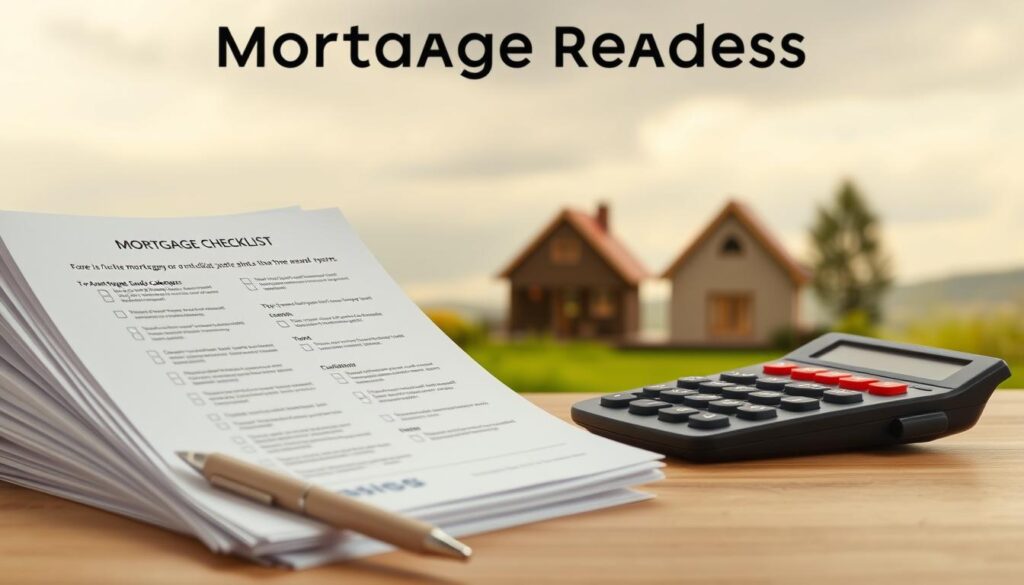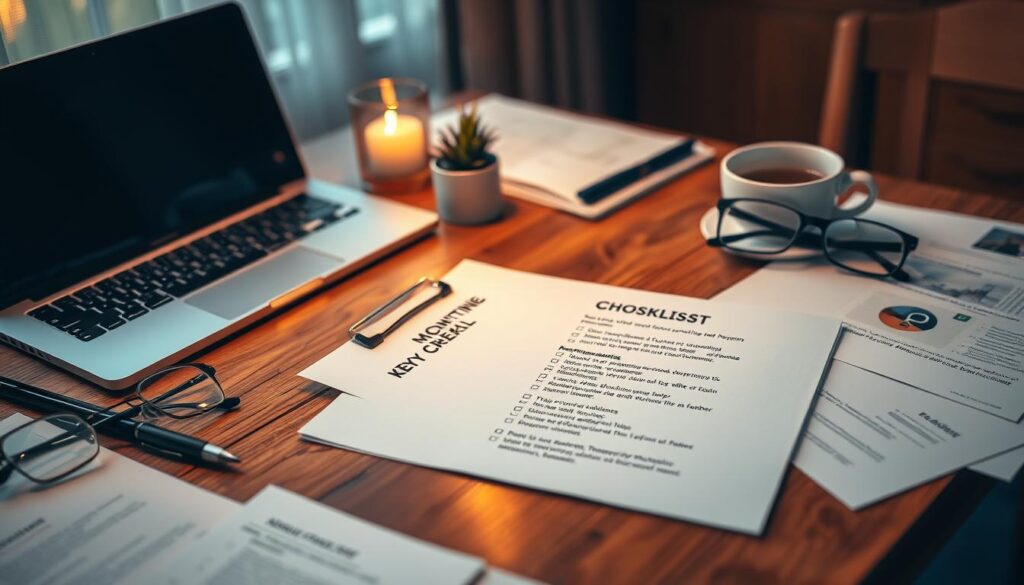Did you know nearly 30% of first-time buyers in the UK take over five years to save for a deposit? The average age of a first-time buyer is now 30. This guide simplifies the journey to homeownership in the UK. We cover saving tips to legal steps, helping you avoid common mistakes.
Contents
- 1 Understanding the UK Housing Market for First-Time Buyers
- 2 Financial Preparation Before You Start Your House Search
- 3 How to Save for a Down Payment in Today’s Economy
- 4 Getting Mortgage-Ready: Essential Steps for First-Time Buyers
- 5 How to Buy House in the UK: The Legal Process Explained
- 6 Property Viewing: What to Look For When House Hunting
- 7 Making an Offer and Negotiating the Purchase Price
- 8 From Offer Acceptance to Completion: Timeline and Key Milestones
- 9 Conclusion: Your Journey to Homeownership in the UK
- 10 FAQ
- 10.1 What is the first step in the step-by-step process to buy my first house in the UK?
- 10.2 How can I save for a deposit as a first-time house buyer?
- 10.3 What documents do I need to prepare when applying for a mortgage?
- 10.4 What is a Mortgage in Principle (MIP) and why is it important?
- 10.5 What should I look for during property viewings?
- 10.6 What does the conveyancing process involve?
- 10.7 How can I increase my chances of making a successful offer?
- 10.8 What should I expect on completion day?
Key Takeaways
- Start financial prep early—saving for a deposit takes time.
- Research UK housing markets to find affordable regions.
- Use government schemes to boost your buying power.
- A mortgage in principle strengthens your position.
- Property surveys and legal checks protect your investment.
Buying a house is a long journey, not a quick race. This guide breaks it down into easy steps. You’ll be ready for every challenge, from budgeting to closing deals. Let’s make buying a house a clear path to follow.
Understanding the UK Housing Market for First-Time Buyers
For first time house buyers, the UK housing market can seem daunting. It’s important to understand current trends and regional differences. This knowledge helps in planning a successful house search. Start by researching property buy costs and market shifts to avoid overspending.
Current Market Conditions
Recent data shows UK home prices rose 5% year-over-year. Low mortgage rates and high demand drive this growth. Key factors shaping the market include:
- Increasing competition in urban areas
- Rising interest in suburban/rural locations
- Government initiatives like Help to Buy schemes
Regional Price Differences
Prices vary widely across regions. First-time buyers may find better value in areas like:
- Yorkshire and Humber (30% below national average)
- North East England (25% lower median prices)
- Wales (15% cheaper than London)
Compare these regions to London’s average £500k+ prices for smarter property buy decisions.
Brexit and Pandemic Impact
Brexit created short-term uncertainty but stabilized post-2021. The pandemic accelerated remote work trends, boosting demand in commuter belt areas. As first time house buyers rethink priorities, flexibility remains key.
“Post-pandemic market shifts mean location and budget planning are more critical than ever,” says Housing Market Analyst Emma Carter.
Financial Preparation Before You Start Your House Search
Before you start looking for a house, make a solid financial plan. First, check your income, debts, and monthly bills to set a budget. Lenders usually say you can borrow up to 4.5 times your yearly income. So, figure out how much you can really afford.
- Look at your debts and credit score. Try to pay off loans with high interest first.
- Save money for emergencies, aiming for 3-6 months’ worth of living costs.
- Remember to include all costs of buying a house, not just the price.
| Cost Item | Estimated Cost |
|---|---|
| Stamp Duty | Varies by property price and buyer type |
| Legal Fees | £800-£1,500 average |
| Surveyor Fees | £300-£1,000 |
| Moving Costs | £500-£1,200 |
Use online mortgage calculators to guess your monthly payments. Lenders look at how much you can afford after paying for other things. Try not to spend more than 30% of your income on a house. Keep all your financial papers ready for when you apply for a mortgage.
“A well-planned budget is the cornerstone of successful house buying,” says the Money and Pensions Service.
Check all the costs of buying a house early to avoid surprises. Start saving for deposits and fees now to make the buying process smoother.
How to Save for a Down Payment in Today’s Economy
Saving for a down payment can seem daunting for first time house buyers. But, with the right strategies, it’s achievable. Whether you’re getting ready to buy a home or looking to buy in the UK, here’s how to start saving:
First Time Buyer Savings Accounts
Accounts like the Lifetime ISA and Help to Buy ISA are made for you. The Lifetime ISA gives a 25% bonus on up to £4,000 a year. But, taking out money before age 60 might cost you. The Help to Buy ISA offers a £1,250 bonus for homes under £450,000. Both have rules but offer great rewards for those who save well.
Government Schemes to Help with Deposits
- Help to Buy Equity Loans: Borrow 5%–20% of a home’s value, repaid when you sell.
- Shared Ownership: Buy a share of a property, reducing upfront costs for first-time buyers.
- First Homes Initiative: Access homes priced 20% below market rate, lowering deposit requirements.
Budgeting Tips for Faster Savings
- Automate savings: Set up automatic transfers to savings accounts each month.
- Cut expenses: Trim subscriptions, dine at home, and track spending to find extra cash.
- Boost income: Sell unused items or take side jobs to funnel extra funds toward your goal.
- Pay off high-interest debt first: Reduce credit card balances to free up monthly cash flow.
Small, consistent steps can lead to big savings. Even with modest incomes, you can save for a deposit in 1–3 years. Start now and watch your savings grow!
Getting Mortgage-Ready: Essential Steps for First-Time Buyers
Getting a mortgage is the first step to owning a home. Start early to meet lenders’ needs. A good plan can help you get approved and get better interest rates.

“A strong credit score opens doors to better mortgage deals.” – National Association of Mortgage Brokers
Here are steps to make your application smoother:
- Mortgage Affordability Check Lenders look at your income, debts, and expenses. Try to keep your debt-to-income ratio under 40%. Use online tools to figure out how much you can borrow.
- Credit Score Boost Check your reports at Experian or TransUnion. Fix any mistakes, pay down credit card balances, and don’t open new accounts before applying.
- Gather Proof of Funds Collect your payslips, 3 months of bank statements, ID, and employment contracts. Keep all documents in one place for easy access.
- Mortgage in Principle (MIP) This free pre-approval shows sellers you’re serious. Include it with your offers to stand out in the competitive real estate market.
Small steps today lead to easier financing tomorrow. Begin now to avoid delays when you find your dream home.
How to Buy House in the UK: The Legal Process Explained
Buying a house in the UK means going through legal steps. It’s important to know the process well. You’ll need to understand the roles of lawyers and the checks they do.
You should hire a conveyancer or solicitor to handle all the paperwork. They will look over contracts, check the property’s title, and manage payments. The cost can vary, so it’s wise to compare prices.
Look for fixed-price deals to avoid unexpected costs. This way, you’ll know exactly how much you’ll pay.
| Search Type | Purpose | Example Issues Found |
|---|---|---|
| Local Authority Search | Checks planning permissions and zoning | Unapproved extensions or flood risks |
| Environmental Search | Discovers pollution or contamination | Past industrial waste or landfill sites |
| Water & Drainage | Verifies water supply and sewage systems | Private drains or waterlogged land |
Freehold means you own the land and the building outright. Leasehold means you rent the land for a set time, like 99 years. Leaseholds often have extra costs, like service charges.
Always check the lease terms for any restrictions or when it might expire.
Title deeds show who owns the property. Stamp duty is a tax based on the property’s price. First-time buyers get a discount on homes under £300k.
Make sure to talk to your conveyancer about any exemptions. This way, you won’t pay too much.
Property Viewing: What to Look For When House Hunting
House hunting can seem daunting, but with the right prep, you’ll feel sure. Each home has its own story. Listen to it. Carry a notebook, a flashlight, and a keen eye.

“A property’s true story is written in its walls and surroundings,” says Mark Thompson, a chartered surveyor with 20 years in UK housing. “Look beyond paint and carpets.”
First, make a must-have checklist:
- Test every light, faucet, and outlet
- Measure doorways for furniture fit
- Note closet and storage space
- Assess natural light flow
Look out for warning signs of hidden costs:
- Peeling plaster or uneven floors (signs of subsidence)
- Musty smells (potential mold)
- Exposed wiring or outdated fuse boxes
- Stained ceilings (roof leaks)
Ask important questions to learn about the home’s past:
- “Has the seller done any recent renovations?”
- “Why is the owner selling?”
- “Are there known issues with neighbors or the street?”
- “How long has this home been on the market?”
Buying a house is more than a quick look. Visit at night to see street noise. Check Wi-Fi and parking. A detailed search shows if this home is right for you or a future problem.
Making an Offer and Negotiating the Purchase Price
Getting the right price for a house starts with research. Look at recent property buy deals in the area to set a fair offer. Estate agents help with negotiations, but remember, offers aren’t final until contracts are signed. This gives you room to adjust your strategy.
Start by offering a bit less than the asking price. If surveys show repairs are needed, use this to ask for a lower price. Sellers who need to sell fast might accept a good offer. Being a first-time buyer can help, as you don’t have a chain of buyers to deal with. Having a mortgage in principle shows you’re serious.
- Offer flexible moving dates to appeal to sellers.
- Highlight your ability to close quickly as a first-time buyer.
- Prepare to revise offers based on seller feedback.
If your offers are rejected or you’re in a bidding war, stay calm. Focus on what makes your purchase home offer stand out. Making smart adjustments can help you win without spending too much. Always keep value and patience in mind during this important time.
From Offer Acceptance to Completion: Timeline and Key Milestones
After you get an accepted offer, the step-by-step process to buy your first house in uk moves to its final stage. This part usually takes 8–12 weeks. But, legal issues or survey findings might cause delays. Use this guide to manage conveyancing, inspections, and final paperwork.
The Conveyancing Process
Legal work is done by solicitors or conveyancers. They:
- Check title deeds and property boundaries
- Look over contracts for hidden fees or restrictions
- Arrange searches on local planning issues
Property Surveys and Inspections
Choose the right survey based on the property’s age and type:
| Type | Cost | Purpose |
|---|---|---|
| Condition Report | £150–£300 | Basic structural overview |
| Homebuyer Report | £300–£500 | Identifies urgent repairs |
| Structural Survey | £500–£1,000 | Deep analysis for older properties |
Exchange of Contracts
“Never skip reading the contract terms before signing.”
After surveys are done, both sides sign contracts. A 10% deposit is paid here. Once exchanged, the sale date is set—no backing out without penalties.
Completion Day: What to Expect
On the agreed date:
- Transfer remaining funds to your solicitor
- Collect keys from estate agents
- Take utility meter readings
- Notify mail services and utilities of your new address
Keep all paperwork organized to avoid delays in the real estate buy process. Double-check all payments and confirm the house buying process is complete before moving in.
Conclusion: Your Journey to Homeownership in the UK
Starting your journey to own a home in the UK begins with careful planning. This guide has shown you the first steps, like saving for a down payment and getting a mortgage. It’s important to research local prices and use government programs like Help to Buy.
Working with trusted agents is also key. Remember, avoid common pitfalls by focusing on thorough inspections and realistic budgets.
For help, check out the UK’s MoneyHelper website and local forums for buyers. Owning a home brings stability and grows your wealth over time. Begin by looking into mortgages and talking to experts. This will kickstart your path to owning a home in the UK.
FAQ
What is the first step in the step-by-step process to buy my first house in the UK?
How can I save for a deposit as a first-time house buyer?
What documents do I need to prepare when applying for a mortgage?
What is a Mortgage in Principle (MIP) and why is it important?
What should I look for during property viewings?
What does the conveyancing process involve?
How can I increase my chances of making a successful offer?
What should I expect on completion day?

Joe Wright is a finance expert, blogger, and author from New York. He recently graduated in finance and writes about loans, credit cards, and money management. Joe helps people understand finance and make smart financial decisions.

